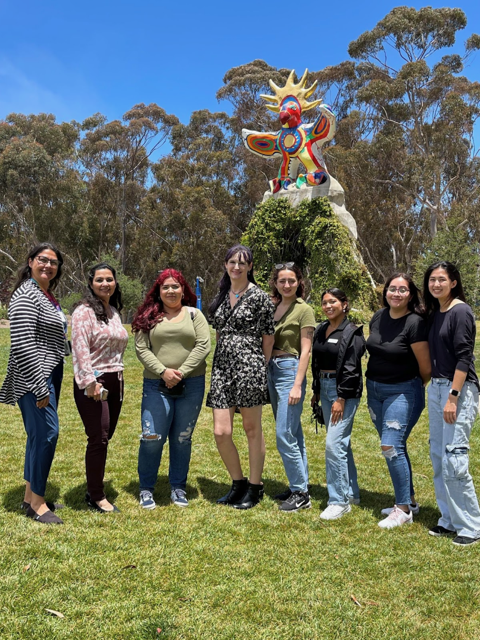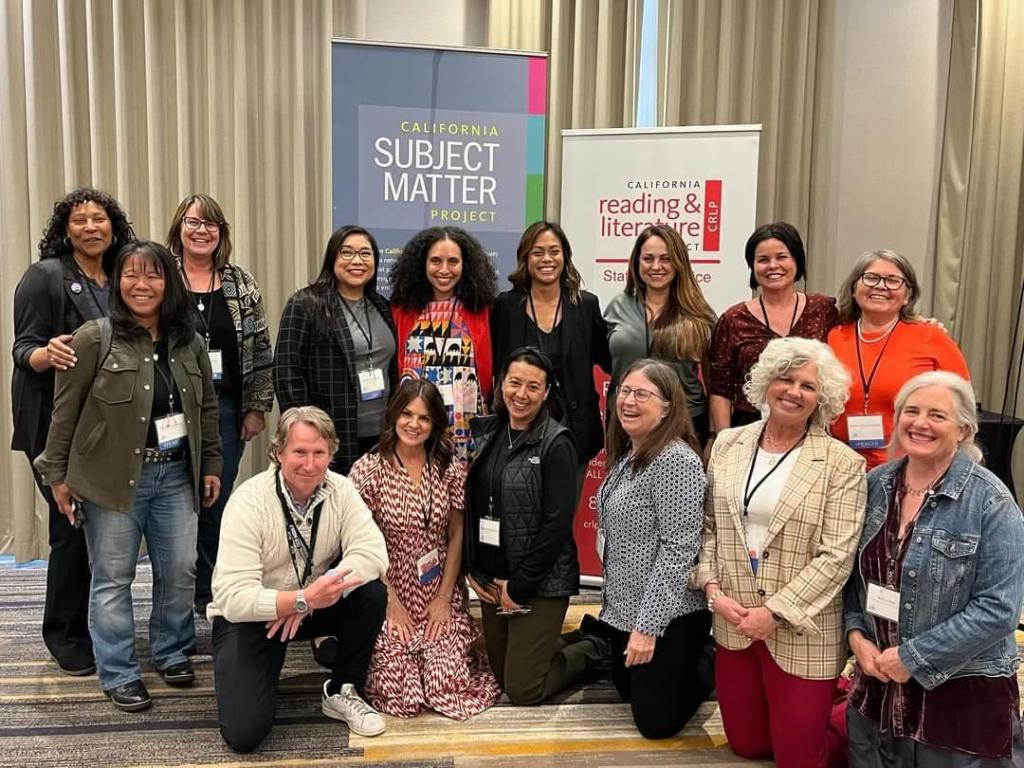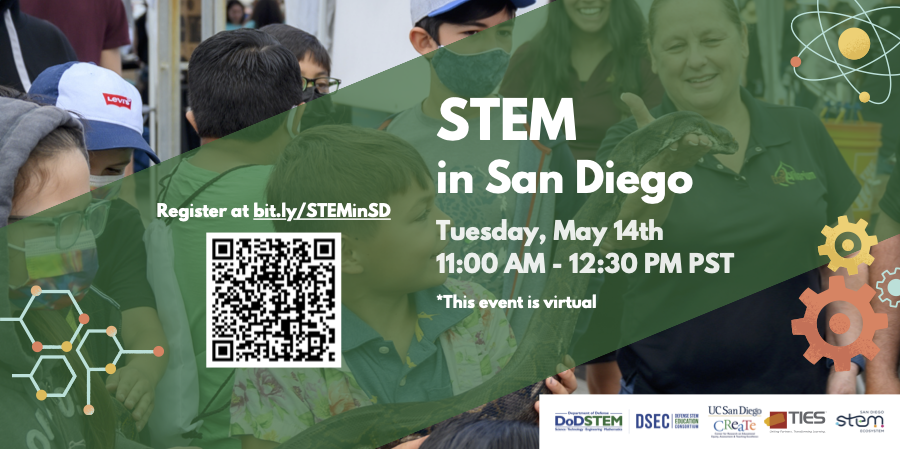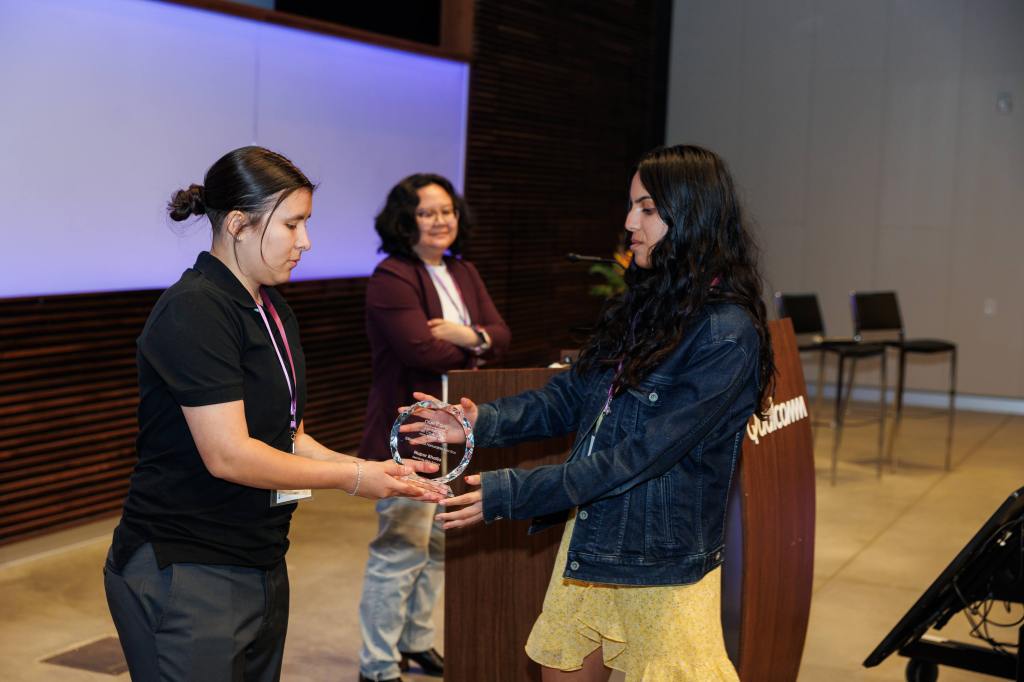STEMULATE: Putting the U(niversity) in Community
Last summer UC San Diego’s Center for Research on Educational Equity, Assessment and Teaching Excellence (CREATE) was thrilled to host 5 students for STEMULATE, a Research Experience for Undergraduates customized to meet the unique needs of Community College students. Initially conceptualized as a one year pilot in 2021, the STEM Undergraduate Learning and Teaching Empowerment program was created in partnership with The San Diego Foundation and CREATE’s own Dr. Beto Vasquez. Thanks to an extension from the San Diego Foundation’s Science & Technology Grant in 2021, unspent funds made it possible to host a smaller cohort this year and provide a similar experience to that of the 2021 STEMULATE Cohort (and hopefully this year – 2023!). Additional funding provided by DoDSTEM and the Rohr Endowment furthered our ability to support additional scholars this summer and provide a unique experience.

Much like the first cohort of STEMULATE students, this year’s participants spent eight-weeks performing hands-on research as Visiting Scholars in laboratories on UC San Diego’s campus with mentorship from faculty researchers. The program allows student researchers to reinforce their identities in STEM by giving back to the community through community service and volunteer opportunities in the Spring semester and by spending the summer familiarizing themselves with the university campus, normalizing daily routines and working in a research lab setting. Students participants received personal, academic and professional development support in order to connect with the broader scientific community in San Diego as well as with each other. Equally important, STEMULATE also provides UC San Diego Graduate Students and Postdoctoral Fellows serving as mentors and supervisors support during their stint with our visiting scholars. We understand that oftentimes these can be new and learning experiences for everyone involved.

After expressing interest and submitting applications, five undergraduate students were selected to participate in STEMULATE 2022. This year’s cohort of community college summer researchers represented an especially diverse group of students from the San Diego Community College District (which includes: San Diego City College, Mesa College, and Miramar College), Grossmont College, and MiraCosta College.

This year’s participants ranged in age from 19 to 50 and were all women. This is nearly three-times higher than the national representation of women in the STEM workforce, 34% as of 2022 (National Girls Collaborative Project, 2022). Additionally, 80% of the STEMULATE Participants were the first in their families to pursue a STEM-related field of study, 40% identified as Latinx, and 20% identified as Native American women.

“It is essential that we continue to strive for more research experience programs like this (specifically for community college students) in order to increase the diversity and inclusion of underrepresented college students,” says program founder Dr. Beto Vasquez. Traditionally, community college students experience specific challenges due to family and personal obligations, which make it more difficult to accept full time internships or laboratory research positions. In addition to receiving highly valuable laboratory research experience and professional development, each participating STEMULATE community college student received a stipend of $4,000 to compensate them for their time and effort, but also making it easier for them to step away from their regular jobs for the summer in order to be able to do research. Again, this was made possible through the financial support of the San Diego Foundation and private donors, as well as great faculty partners that were willing to host our students.

As a testament to this program’s effectiveness with students as well as researchers, there is a high retention rate of STEMULATE faculty members hosting guest community college students in their labs. The STEMULATE 2022 host faculty researchers included: Alisa Huffaker (Biology), Jonathan Shurin (Biology), Yu-Hwa Lo (Electrical Engineering), Oscar Vazquez Mena (Nano Engineering) and Lalit Deshmuk (Chemistry), many of whom also participated in summer 2021. Esteemed faculty members either personally led and/or provided our students a graduate student / postdoc mentor to guide and help undergraduate researchers to take ownership of projects in a wide range of research topics this year, including Cell & Developmental Biology, Ecology and Nanoengineering.
Ugbad Farah, a graduate student in the Shurin lab said “Being a research mentor through STEMULATE has been a wonderful experience; the students in the program are exceptional and so great to work with. I have learned so much through the program by working with students from different backgrounds and expertise. One of my favorite parts of the research program was having the students use the skills they’ve used in other jobs or classes and applying it to the work we were doing in the lab. Overall, this was a learning experience for both the STEMULATE intern and myself as the mentor!”

STEMULATE student researchers also attended seminars designed to further develop their academic research skills and knowledge of the research occurring on campus. “Students in the program will be able to do better in all their classes and return to their campuses better equipped to choose a post graduation STEM path due to the seminars they attended in summer and the connections they were able to make with faculty and graduate students” says Program Specialist Marisela Chevez.
The Visiting Scholars also had the opportunity to present at the UC San Diego Summer Research Conference at the end of their undergraduate research experiences this summer. Tessa Sterns presented her research from Dr. Lo’s lab, “Cell Protein Analysis Utilizing Capillary Array.” Yuliza Venegas presented her research in the Vasquez Mena lab, “Quantum Dots as light sensitizers for Graphene.” Shoreh Ketabian introduced her project, “Phosphorylation of Asparaginase modifies the innate immune responses in Arabidopsis thaliana” in Dr. Huffaker’s lab. At the end of the summer Shoreh was also selected as a participant of ROOTS, or Research Opportunity for Transfer students, an NSF funded program at UCSD designed to get incoming transfer students into lab research roles right away. This interconnectivity is a natural result of programs designed with equity and diversity at the forefront.

“To continue to increase diversity and inclusion of underrepresented students in the STEM career pipeline, it is essential to be intentional about the types of research experience programs created for undergraduate students, the application process, and the participant selection process for these programs. The positive impact created is undeniable: the sense of belonging, networking, and skills obtained through research programs show the importance of helping bridge the gap of access between 2-year and 4-year undergraduate students. We look forward to seeing what our participants go on to do over the next few years and hope to be able to host more students in the future,” says Dr. Vasquez.

“STEMULATE’s hands-on research experience helped me develop confidence in a laboratory. Because of the program I now know that grad school and research will be part of my academic goals,” says program participant Tessa Sterns. Tessa, a biology major who worked as a chef for 15 years before being inspired to pursue science during the pandemic, spent her summer on a nanoengineering project in the Lo lab.
Xinyu Chen, Tessa’s graduate student mentor, shared that “working with Tessa greatly improved my communication skills, especially when explaining some technical terminologies.” Xinyu added that “Tessa’s experience as a former chef is an advantage for her. Because this experience gave her a meticulous personality, which is crucial in many hands-on lab experiments, including mine. For example, she is very good at using tweezers, which exist in both labs and kitchens. Some other small habits like paying attention to the lab safety, always cleaning up and putting things back to their original positions, are usually hard to follow for new students, but Tessa did them very well.”
Special thanks is extended to the STEMULATE 2022 host faculty researchers: Dr. Lalit Deshmukh, Dr. Alisa Huffaker, Dr. Yu-Hwa Lo, Dr. Jonathan Shurin, Dr. Oscar Vazquez Mena, and their host laboratories.
The 2022 STEMULATE Undergraduate Student Researchers:
- Michelle Israel – Biochemistry Research, Mentored by: Dr. Lalit Deshmukh and Graduate Student Ruben Elias
- Shoreh Ketabian – Cellular Biology Research, Mentored by: Dr. Alisa Huffaker and Postdoctoral Fellow Dr. Sowmya Poosapati
- Julia Novoa – Environmental Science Research, Mentored by Dr. Jonathan Shurin and Graduate Student Ugbad Farah
- Tessa Sterns Bioelectronics Engineering Research, Mentored by Dr. Yu-Hwa Lo and Graduate Student Xinyu Chen
- Yuliza Venegas – Nanoengineering Research, Mentored by Dr. Oscar Vazquez Mena
If you would like to learn more (about applying for the 2023 program), get involved, or fund this project, please contact Dr. Beto Vasquez at alv002@ucsd.edu.





